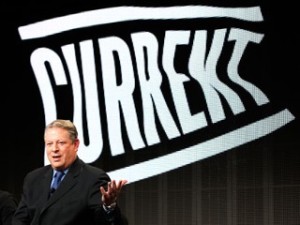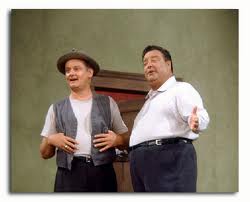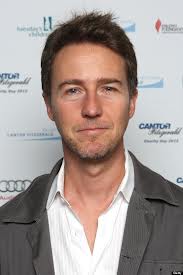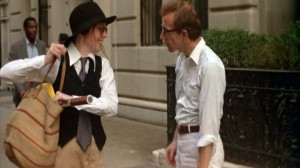It’s the summer of 1977. I am a full year away from graduating from college, poor as a churchmouse, but excited about the fact that I just might finish college and get a real job making real money. Movies are shown on the  lawn at the student union. First Carrie, then Network. Finally, Annie Hall. Annie’d come out the previous April, to so-so reviews in still-provincial Gainesville. But I talked my friends into going to see it, because we’d seen Take the Money and Run and really liked it.
lawn at the student union. First Carrie, then Network. Finally, Annie Hall. Annie’d come out the previous April, to so-so reviews in still-provincial Gainesville. But I talked my friends into going to see it, because we’d seen Take the Money and Run and really liked it.
Annie Hall was hilarious, and sad and poignant and complex. My friends hated it. I loved it.
So here we are 36 years later. I’m flipping through the channels, desperately seeking some distraction from boring late-night television (I am a chronic insomniac, so I have to be totally exhausted to get to sleep and STAY asleep). I happen on some obscure channel like  Current TV before it became Al Jazeera and there’s a conversation going on between Ed Norton and Elvis Mitchell.
Current TV before it became Al Jazeera and there’s a conversation going on between Ed Norton and Elvis Mitchell.
Now those two names together just sound funny. If you’re old, you think of  Ed Norton as Ralph Kramdon’s buddy and neighbor. Elvis…well, is
Ed Norton as Ralph Kramdon’s buddy and neighbor. Elvis…well, is  Elvis.
Elvis.
But no,  Ed Norton is a fabulous young writer/actor/director and Elvis Mitchell was the movie critic for the NY Times for a while. Ed Norton is incredibly talented, having saved Salma Hayak from excess and sloth (good combo, eh?) in editing and finishing one of my favorite movies, Frida, about the Mexican artist Frida Calho.
Ed Norton is a fabulous young writer/actor/director and Elvis Mitchell was the movie critic for the NY Times for a while. Ed Norton is incredibly talented, having saved Salma Hayak from excess and sloth (good combo, eh?) in editing and finishing one of my favorite movies, Frida, about the Mexican artist Frida Calho.  Elvis Mitchell has the longest dreadlocks I’ve ever seen, and is a really lousy interviewer…but I digress.
Elvis Mitchell has the longest dreadlocks I’ve ever seen, and is a really lousy interviewer…but I digress.
Here’s where I’m going with this. In the course of their conversation, Ed mentions a book to Elvis, When the Shooting Stops, the Cutting Begins
by Ralph Rosenblum. I downloaded the book on my Kindle, and was astonished at what I read. A couple of my favorite movies were likely saved by the editing of this guy, Rosenblum. A Thousand Clowns sort of started the movie look that led to Butch Cassidy-type insert of sepia-toned photos and old video to liven things up. Ralph invented that. He made The Producers for a totally insane Mel Brooks (no big surprise there). But he saved the best for nearly the last chapter in the book: how Ralph and his editing transformed Woody Allen’s neurotic ramblings into Annie Hall.
Ralph explains that the rough cut of Annie Hall was “an untitled and chaotic collection of bits and pieces that seemed to defy continuity, bewilder its creators, and…held the least promise for popular success.” Doesn’t sound very encouraging, does it? Woody wanted to call it Anhedonia, meaning the inability to experience pleasure. The first cut of the movie wasn’t much about the character Diane portrayed; it was all Woody all the time. It was two hours and twenty minutes long. It was supposed to take place in Woody’s mind. Picture spending that amount of time running around a small, Jewish man’s brain. Too much…
The story Ralph tells in this book is filled with outtakes from the movie that are really, pretty funny … but apparently didn’t work in the final cut. Marshall Brickman, Woody’s frequent collaborator, said “…all that stuff that Woody and I had written was cerebral, surreal, highly intellectual, overliterate, overeducated, self-conscious commentary.” Oh, let me have some more, please!
So Ralph goes on to tell the story of how he, Marshall, Woody and Ralph’s assistant went on to edit the film into what eventually became the final version of Annie Hall. I think these lines sum up what happened: “…the quality was all there in the first cut. Anyone reading the unabridged shooting script would be overwhelmed by the authors’ comic genius. The special job in editing this picture was to find the plot amid all the brilliant skits.”
I have made small videos in the past – a couple of them are on this site. I can assure you that my amateur efforts are just that – but from the heart. However, the process of making 4 to 8 minute videos often took multiple hours to finish. This taught me a lot about how hard it is to make a story work on a screen. Editing is tricky, and sometimes you have to just jump in and hope for the best. Sometimes inspiration hits in the middle, and you completely change what you were trying to say. Other times you think what you made is fabulous, only to have people turn to you and ask, what were you thinking? So, Ralph Rosenblum, wherever you are (Ralph died in 1995 at the young age of 69), bless you. Your talents made Annie Hall a pleasure to watch. I hope you’re still working that movieola in heaven.

